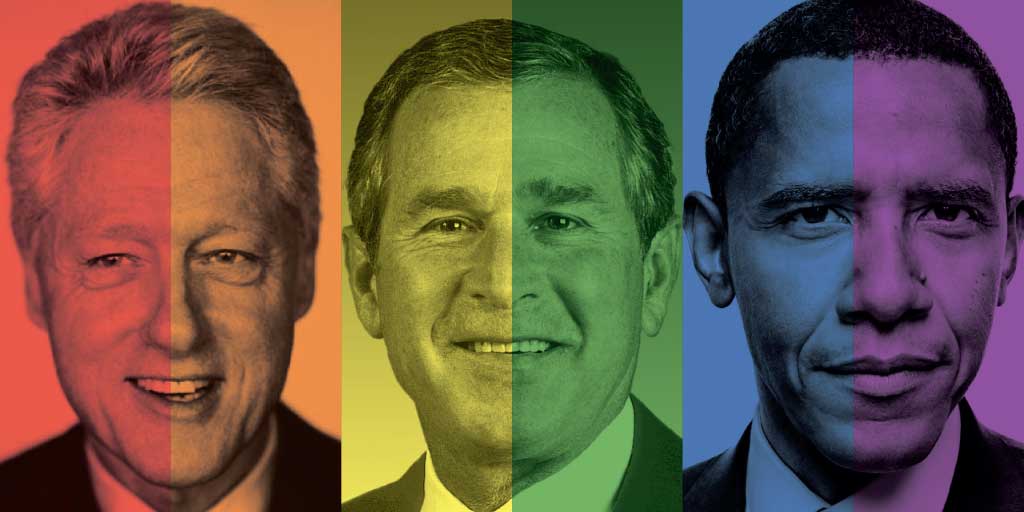When President Obama told Robin Roberts on ABC in May 2012 that he supported same-sex marriage, he added, “I’ve stood on the side of broader equality for the LGBT community.” Thus, in the context of an Obama presidency, Wednesday’s announcement that Obama condemned conversion or “reparative” therapy for LGBT youth could seem like just one more example of the president standing “on the side of broader equality for the LGBT community.” Less than two years into his first administration, he repealed Don’t Ask, Don’t Tell. A year and a half later, he became the first sitting president to endorse same-sex marriage, and has since then stated his support for the end of bans on gay marriage.
But Obama hasn’t always been this vocal when discussing LGBT issues. No president or candidate has been. Thus, in a larger context, Wednesday’s announcement signalled that once again, the Obama presidency could be remembered for how Obama talked about and interacted with the LBGT community in a way different from past presidents. Because, in a larger context, this entire time in US history will be remembered for how society as a whole changed the way it talked about and interacted with the gay community, regardless of who was president at the time.

One need not go back too far in history to see how US presidents have evolved when talking about LGBT issues. This is a cursory list, and is certainly not meant to be exhaustive.
1993
President Clinton announced and later signed the policy that would become known as “Don’t Ask, Don’t Tell,” in which LGBT members of the military could continue to serve, but not openly. The policy forced gays to hide their sexual orientation or face dismissal. More than 13,500 people were discharged under the rule since 1993.
Sept. 21, 1996
President Clinton signed the Defense of Marriage Act, allowing states to refuse to recognize same-sex marriages performed under laws of other states. Between then and the general election in November, Clinton’s campaign broadcasted ads on Christian radio touting that he had signed the Defense of Marriage Act.
Feb. 24, 2004
President George W. Bush announced support for a constitutional amendment banning gay marriage.
Aug. 3, 2004
Missouri voters passed an amendment that added a ban on gay marriage to the state constitution. Senator John F. Kerry, who was then the Democratic presidential nominee, said in an interview published with the Kansas City Star later that week that he would have voted for the gay marriage ban.
Nov. 2008
Barack Obama and John McCain faced each other in the general election. Though both men said they oppose same-sex marriage, they disagreed on whether the state constitutions should ban it.
Dec. 22, 2010
President Barack Obama signed legislation allowing gays to serve openly in America’s military, repealing “Don’t Ask, Don’t Tell”.
Feb. 23, 2011
President Obama declared that he will no longer defend DOMA.
March 2013
Former president Bill Clinton wrote an op-ed for The Washington Post, calling for The Defense of Marriage Act to be overturned. “As the president who signed the act into law, I have come to believe that DOMA is contrary to those principles and, in fact, incompatible with our Constitution,” Clinton wrote.
January 2015
President Obama became the first president to use the word “transgender” in a State of the Union Speech.
This, of course, is a very incomplete list. And this is not to say that Obama always had the same stances on LGBT issues. He will often say that he evolved. Clinton himself said that when he signed DOMA, it was a “different time.”
I wrote last year that some bloggers and pundits thought Obama had unfairly gotten a “pass” on his 2008 statements on gay marriage. The unifying question was this: If Brendan Eich had to resign as CEO of Mozilla because he gave $1,000 to support Proposition 8 in 2008, why does Barack Obama get a pass for saying in 2008 that marriage should be between a man and a woman?
As I wrote then:
If Obama or anyone who voiced opposition to same-sex marriage ever got a “pass,” it certainly wasn’t an across-the-board pass from the LGBTQ community. A quick Google search of the terms “Obama” “gay marriage” shows quickly that prominent sites and blogs about LGBTQ issues — The Advocate, The Bilerico Project, GoodAsYou and Towleroad — show that Obama, Hillary Clinton and other Democrats did not get a “pass” on their stances on same-sex marriage or other issues. Bill Clinton, the president who signed the Defense of Marriage Act into law, didn’t receive a pass last year when he wrote an op-ed denouncing the law.
How presidential candidates will discuss gay marriage will probably be strongly influenced by how the Supreme Court will rule this year on the topic. It’s not an issue that will go away. Obama’s presidency does not mean that no candidate will ever oppose same-sex marriage again.
Nor do the LGBT milestones during an Obama presidency mean that he is responsible for them. As I said earlier, the Obama presidency could be remembered for how Obama talked about and interacted with the LBGT community in a way different from past presidents. But that probably has a lot to do with the fact that this entire time in US history will be remembered for how society as a whole changed the way it talked about and interacted with the gay community, regardless of who was president at the time.
